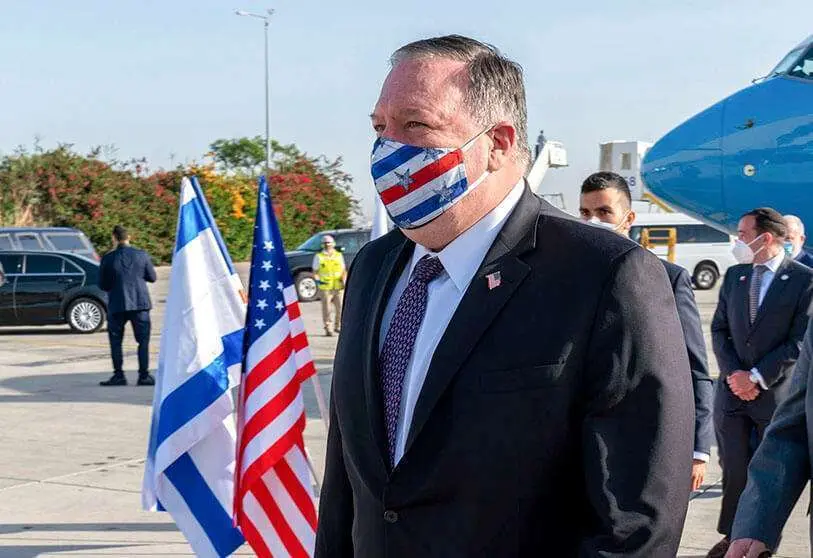Pompeo visits Israel to discuss the West Bank annexation and the regional conflict with Iran

Mike Pompeo, the US Secretary of State, has travelled to Israel to meet with Prime Minister Benjamin Netanyahu and the other protagonist of the next unity government, Benny Gantz, in order to deal with important issues such as the territorial threat represented by Iran with its belligerent attitude or the Hebrew proposal for the West Bank's annexation, which is planned to take place from July onwards.
Pompeo's visit, of less than 24 hours, is the first one of a foreign leader to Israel since the Israeli State closed the borders to prevent the spread of the COVID-19 disease, and it takes place on the eve of the inauguration of the new unity Executive formed by the main rivals of the last elections Netanyahu and Gantz.
The plan to incorporate and implement Israeli jurisdiction over part of the occupied Palestinian territory of the West Bank, which was supported by the United States as part of its peace proposal launched to resolve the Palestinian-Israeli conflict, which did not receive the support of the international community or, logically, of the entire Arab community, has become one of the key points to be discussed at this diplomatic summit. "We have to make progress on this issue," said Pompeo shortly after he landed in Tel Aviv, referring to the plan to resolve the Palestinian conflict drawn up by the US government of Donald Trump, who called it "the agreement of the century".

The American approach proposed the creation of a Palestinian state with limited sovereignty, annexation of part of the occupied West Bank and a Palestinian capital in a small area on the outskirts of East Jerusalem. The essence of the proposal was to establish Palestinian enclaves with limited capacity of independence, located between Israeli settlements, under the promise of halting the construction of new settlements by Jewish settlers in the West Bank. In addition, it proposed that Israel should keep the Jordan Valley and Jerusalem and its holy sites, giving the Palestinians the possibility of locating the capital of what would be their new State entity in a special area of the Holy City between Abu Dis and the eastern part of Shuafat, areas already segregated by a concrete wall. In this case, the ultimate Palestinian aspiration would be to move its capital and the seats of its official institutions to the periphery of East Jerusalem. The Trump Administration's plan also urged the Palestinian leadership to renounce the claim to the territories that Israel annexed after the 1948 conflict, stressing that no Palestinian refugee will be given the right to return to Israeli territory.

For the creation of this desired state, the Palestinians were also required to establish a reliable administration and financial institutions, which was linked to another of the highlights of the offer made and on which Donald Trump was most confident, which was the provision of investment money on Palestinian soil when the new state was established. A sum of some 50 billion dollars aimed at the implementation of what would be the new Palestine.
In a short joint statement with Netanyahu, Pompeo spoke of Iran and the US efforts to limit Iran's ability to act in order to "harm Israel and other countries"; a policy that "has borne fruit and been successful", he stressed. The US diplomat condemned the regime in Tehran for trying to promote global terrorism while its people suffer from the onslaught of the global coronavirus pandemic. Iran is spreading its tentacles in different countries through the Quds Forces, a division of the Iranian Islamic Revolutionary Guard (an elite body of the Persian Army) that operates internationally by associating with Shiite forces to intervene in the internal affairs of these nations. This is the case in Lebanon and the armed groups of Hezbollah, Yemen and the Houthi rebels, Iraq and the People's Mobilization Forces or Syria and the militias of Afghan origin of Liwa Fatemiyoun.

For his part, Benjamin Netanyahu said that the main issue on his agenda will be the fight against COVID-19 and, secondly, "another plague" such as the Iranian threat. Regarding the next constitution of the unity government, which puts an end to nearly a year and a half of political blockade with a sitting Executive in Israel, it will be, he said: "An opportunity to promote peace and security, based on the understandings I reached with President Trump during my last visit to Washington in January", a trip that focused on discussing the US peace plan for the Middle East.

The Islamic Republic of Iran has been singled out in recent months for regional insecurity in the Middle East. An escalation of tension derived from the economic sanctions imposed by Washington on Teheran in 2018 after the US abandoned the nuclear agreement signed in 2015 (JCPOA) limiting the Persian atomic programme, especially regarding the armament issue. These measures were mainly focused on oil, the main source of Iranian funding, seriously hitting the economy of the Ayatollahs' regime, and received the response of Hassan Rohani, President of Iran, who threatened to continue trading with his oil and to blockade the Strait of Ormuz, the main passageway for world oil trade.

In this scenario, several episodes of attacks to cargo ships in Gulf waters and offensives against oil and airport infrastructures in Saudi Arabia, a great representative of the Sunni branch of Islam opposed to the Shiite one sponsored by Iran, took place. These incidents were blamed on the ayatollahs' regime and on pro-Iranian agents, such as the Houthi rebels fighting in Yemen's war against the internationally recognised government of Abd Rabbuh Mansur al-Hadi, which is in turn defended by an Arab coalition led by the Saudi kingdom.










